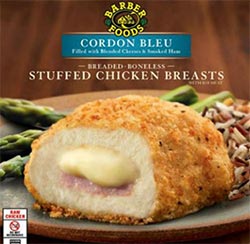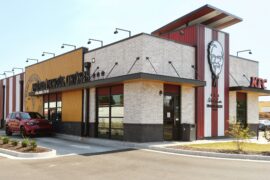Portland, Maine-based Barber Foods is expanding its recall to approximately 1,707,494 pounds of frozen, raw stuffed chicken products due to concern over possible Salmonella Enteritidis contamination, according to the US Department of Agriculture’s Food Safety and Inspection Service (FSIS). The products were produced between February 17 and May 20, 2015.
 Since a smaller initial recall earlier this month, two more case-patients have been identified, bringing the total to eight. The scope of this recall expansion now includes all products associated with possible contaminated source material.
Since a smaller initial recall earlier this month, two more case-patients have been identified, bringing the total to eight. The scope of this recall expansion now includes all products associated with possible contaminated source material.
The recall’s first wave began on July 2, encompassing approximately 58,320 pounds of frozen, raw, stuffed chicken items produced on January 29, February 20 and April 23, 2015, described as follows: 2-lb. 4-oz. cardboard box containing six individually pouched pieces of “Barber Foods Premium Entrees Breaded-Boneless Raw Stuffed Chicken Breasts with Rib Meat Kiev” with use by/sell by dates of April 28, 2016; May 20, 2016; and July 21, 2016. Lot code numbers are 0950292102, 0950512101, or 0951132202.
All products subject to the recall, shipped under the Barber Foods brand name and private labels to retail locations throughout the USA and Canada, bear the establishment number “P-276” inside the USDA mark of inspection. Items affected run the gamut from Chicken Kiev and Cordon Bleu to Ham and Cheese, Chicken Tenders – Italian, to Canada Cordon Swiss and others.
Illnesses Reported in two States
The FSIS was first notified of a cluster of Salmonella Enteritidis illnesses on June 24. Working in conjunction with the Minnesota State Departments of Health and Agriculture, Wisconsin Department of Health Services, and the Centers for Disease Control and Prevention, it determined that there is a link between the frozen, raw, stuffed chicken products from Barber Foods and this illness cluster. Based on epidemiological evidence and traceback investigations, six case-patients were identified in Minnesota and Wisconsin with illness onset dates ranging from April 5 to June 23 that link to the specific Barber Foods products. The FSIS continues to work with public health partners on this investigation.
Consumption of food contaminated with Salmonella can cause salmonellosis, one of the most common bacterial foodborne illnesses. The most common symptoms of salmonellosis are diarrhea, abdominal cramps and fever within 12 to 72 hours after exposure to the organism. The illness usually lasts four to seven days. Most people recover without treatment. In some cases, however, the diarrhea may be so severe that the patient needs to be hospitalized. Older adults, infants and persons with weakened immune systems are more likely to develop a severe illness.
The FSIS and Barber Foods, a unit of Cincinnati, Ohio-headquartered AdvancePierre, Inc., are concerned that some products may still be in consumers’ home freezers. Although the chicken subject to recall may appear to be cooked, it is in fact raw and uncooked and thus should be handled carefully to avoid cross-contamination in the kitchen. Particular attention needs to be paid to safely prepare and cook these raw poultry products to a temperature of 165° F at the center, the thickest part, and at the surface of the product.
These frozen, raw, stuffed chicken packs were labeled with instructions identifying that the product was raw and included cooking instructions for preparation. Some case-patients reported following the cooking instructions on the label and using a food thermometer to confirm that the recommended temperature was achieved. Therefore, FSIS advises all consumers to treat these products like a raw chicken product. Hands and any surfaces, including surfaces that may have breading dislodged from the products, should be cleaned after contact. Also, raw poultry should be kept away from other food that will not be cooked. Use one cutting board for raw poultry and a separate one for fresh produce and cooked foods.





